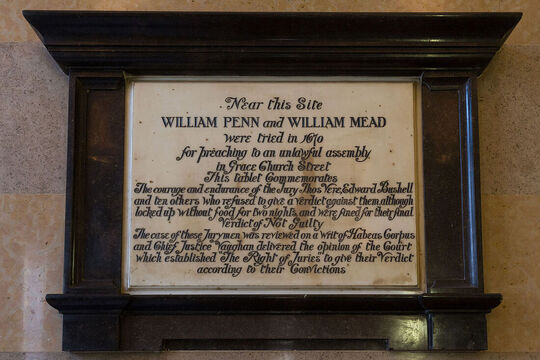|
Trial by a jury of your peers is a current maxim of English Law and has come under scrutiny with the outcome of the case of the Colston 4 who were found not guilty of criminal damage to the statue of Edward Colston in Bristol.
Jury trial is not an invention of English law nor is it peculiar to our legal system. It dates back to ancient Greece, the Roman Empire and Islamic law. However it is now an integral part of the English criminal justice system; enshrined in Magna Carta and beloved of jurists. The Old Bailey has played a significant role in the development of the jury system. It had been the case until the 17th century that juries were led by or expected to find as the Judge directed. A case of conscience came to the Old Bailey in 1670 when two Quakers who were preaching to a crowd in Gracechurch Street in the City were charged with unlawful assembly. The jury would not find them guilty and the Judge was incensed and locked the jury up without food, water or heating until they came to a “ verdict that the court will accept”. One of the defendants was the famous William Penn (later to be founder of Pennsylvania) and he shouted to the jury “You are Englishmen, mind your privilege give not away your right”. After two days the jury still stood firm and so the Judge accepted the determination but fined the jury for contempt of court and they were sent to prison until they paid the fine. One juror was Edward Bushell who petitioned for a write of habeas corpus – against unlawful detention. This went to the Court of the Chief Justice who determined that the jury could not be punished simply on account of the verdict it returned. Thus enshrining the right to the conscience of the jury to convict or acquit as they saw fit. Sometimes referred to as a perverse verdict, the same situation arose in 1984 when civil servant Clive Ponting who had leaked papers about the sinking of the Belgrano in the Falklands War was acquitted by a jury in Court 1 at the Old Bailey. He had been charged under the Official Secrets Act and the Judge had directed the jury to convict him as he did not deny that he handed the papers to the MP concerned but pleaded as defence that the release of the papers was in the public interest. The jury acquitted. Both these previous cases have resonance with the trial and outcome of the Colston 4. There are some technical legal issues around the Colston case that I will not unpick fully here but it is clear in all cases that the prosecution need to prove their case “beyond reasonable doubt” or so that the jury is sure. In the case of criminal damage the defendants can legally raise the issue of a lawful excuse as to what they did (which, in turn, the prosecution also need to disprove). But there is a further aspect to this case that echoes that of Bushell and that is the right of freedom of thought and conscience. Rights that are now guaranteed in the European Convention on Human Rights but did exist in the 17th century as well. Indeed the interplay of the Convention and the English law was a key element in a recent Supreme Court case of DPP- vs– Ziegler in 2021 and others so there is very current judicial opinion on this question. The Ziegler case concerned a protest against an arms fair in London and, in summary, decided that the Court is required to consider whether convicting the defendants would represent a proportionate interference with the exercise of those human rights.
0 Comments
|
Details
AuthorAlison Gowman Archives
January 2024
Categories
All
|
Follow Alderman Alison Gowman on Twitter: https://twitter.com/GowmanAJ
Alison Gowman: As an elected Alderman within the City of London: https://democracy.cityoflondon.gov.uk/mgUserInfo.aspx?UID=229
Privacy policy: https://www.alisongowman.org/privacy.html
Cookie policy: https://www.alisongowman.org/cookies.html
Terms & conditions of website usage: https://www.alisongowman.org/tandc.html
Alison Gowman: As an elected Alderman within the City of London: https://democracy.cityoflondon.gov.uk/mgUserInfo.aspx?UID=229
Privacy policy: https://www.alisongowman.org/privacy.html
Cookie policy: https://www.alisongowman.org/cookies.html
Terms & conditions of website usage: https://www.alisongowman.org/tandc.html


 RSS Feed
RSS Feed